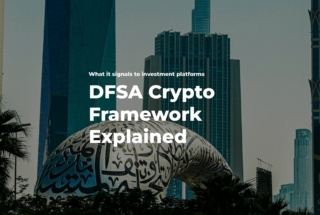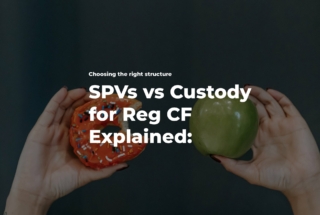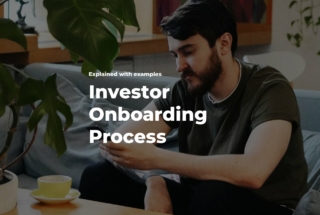All You Need to Know About KYC in Crowdfunding
No time to read? Let AI give you a quick summary of this article.
Every investment management firm has to check the identity, assess reliability, and foresee the risks associated with startups and investors joining a crowdfunding platform.
Understanding what is KYC and why it is important is vital for a crowdfunding business as it’s a first-line requirement for finding good deals and reliable investors.
What you will learn in this post:
What is KYC?
KYC or “Know Your Customer” is an obligatory procedure to first, identify and then verify the identity of investors and startups in crowdinvesting.
Often, a crowdfunding platform will have a dedicated compliance team that will take care of the KYC/AML process. When sourcing and onboarding new clients on the platform, the risk and compliance team ensures that a crowdfunding business follows anti-money laundering rules and is working only with authentic customers.
The KYC/AML processes can be set up with the help of an in-house team or by partnering with a third-party provider that specializes in automated KYC checks. For instance, VIX Verify offers both integrated Know Your Customer and Know Your Business solutions.
Its GreenID1 helps companies perform a real-time consumer onboarding by verifying identity, performing biometric identity check, global document authentication, PEP (Politically Exposed Persons) list and global sanctions screening, etc.
GreenID Business2 helps assess corporate entities and the individuals related to them. The program runs an applicant’s data through relevant government registries helping businesses decrease operational costs associated with manual checks.
There are a number of similar solution providers that offer seamless KYC/AML checks. MangoPay3, LemonWay4, and Goji investments5 are just a few of them.
Also read: What is AML and How Does it Work?Who demands that platforms have KYC/AML procedures
The Financial Conduct Authority (FCA) is the UK’s policy maker that obliges crowdfunding platforms to perform due diligence. COB 5.26 is a section of FCA’s handbook dedicated to Know your customer process.
In the US, the Securities and Exchange Commission (SEC) has in its Regulation Crowdfunding Additional Requirements7 section that addresses compliance matters and requires crowdfunding ‘intermediaries’ to follow federal securities laws.
However, crowdfunding platforms always take the initiative to conduct thorough due diligence of both inventors and fundraising companies because it’s just a part of their business operations. The reputation of a company and profits are at stake, so professional crowdfunding platforms rarely fail to assess business as they reject 9 in 10 businesses that apply to fundraise. That is to say, only indeed qualified businesses enter the platform, however, even that doesn’t always guarantee the performance.
Why is the KYC process essential?
The world has become a global playground. Privacy (and even anonymity in some cases) in the global landscape is good. A company in the UK might serve the needs of clients seven seas away like London-based TransferWise does, for instance.
But such an arrangement levels up risks of fraud and likelihood of financial crimes. Thus, similar to a regular financial institution, TransferWise has to know that its users are who they claim to be. Thus, it thoroughly checks a user identity before an account opening.
KYC/AML procedures do both – solve problems and raise concerns. Platforms have to protect investors and themselves, while startups don’t want to have their ideas stolen. This places both regulators and platforms in a complicated position of what information should be disclosed, how it should be stored, for how long, and who is responsible.
Also read: The risks of managing a crowdfunding platformHowever, people with fake identities as well as the companies with fraudulent business activities are not the type of customers to keep. Those looking for short-term gratification and success derail the economy and genuine businesses. A reputable business does not want to be a part of that drama, hinder its operations, and ruin its image.
Unfortunately, banking and insurance sectors are among the top domains used for money laundering. All those scandals you’ve heard of happened for a reason.
HSBC paid authorities 1.9 billion dollars8 of fines for having failed to enhance anti-money laundering controls. Similarly, Switzerland had to freeze 900 million dollars 9of a key figure in an Angolan insurance company accusing him of money-laundering.
Crowdfunding is a less mature industry than banking. However, with no exception, it needs to fulfill KYC compliance obligations to mitigate such risks and not make the headlines. Overall, the regulators of the US and UK financial markets penalized companies for 8.14 billion dollars in 2019; 30%10 of these fines were due to anti-money laundering (AML) incompliance.
Types of KYC
Usually, there are different layers to KYC. There’s basic and in-depth due diligence.
- ID verification of a customer is a bare minimum and it includes ID card, name, and address checks. These steps help a company to assign risk rates to a particular client.
- If a customer is a high-risk entity, a business will conduct an enhanced check including financial statements, transactions history, valuation, previous fundraising activities, fundraising goals (for startups).
So, the main difference between basic and enhanced due diligence lies in the scope of work and processes. A crowdfunding platform does KYC/AML checks of investors before allowing them to browse through available campaigns. As for startups, it verifies their credibility before they can post their offerings on the platform.
And even after they are allowed on the platform, there is an ongoing monitoring and controlling of irregular behavior to exclude a potential fraud or any other illegal activity.
KYC in crowdfunding vs Venture Capital or Angel Investing
Many crowdfunding platforms are formed by teams with previous venture capital, angel investing or investment banking experience. In traditional investment management, KYC/AML procedures have already been tested thousands of times, so crowdfunding is simply leveraging what’s already known.
What do angel investors usually expect to see before making a final decision to invest? They typically require the following11:
- proof of identity
- proof of incorporation
- the business plan
- profit and loss as well as balance sheet (if a company looking for funding is already in business)
- the list of current backers and details on past funding rounds
- the proof of ownership of intellectual property
- agreements that define the working relations with employees.
To assess a potential investment opportunity, a VC firm normally checks this startup information12:
- history and corporate structure + any partnerships and joint ventures
- resumes of management, details of key associates, organizational charts, any recent or upcoming changes of C-suite executives
- intellectual property including present and pending patents, copyrights and trademarks and claims and litigation against or by a startup regarding patents and patent violation
- 3-5 year financial statements + info about past funding
- legal and tax matters including any issues with income or employment taxes.
- recent acquisition, divestiture, or restructuring documentation.
Depending on the crowdfunding regulation the company is fundraising under and the level of its business maturity, a crowdfunding investment manager will conduct the set of checks to ensure that the company is legit.
How KYC in a crowdfunding platform technically works
KYC in crowdfunding is technically similar to any other KYC. While the offline part of the data gathering for the due diligence is clear to any manager, in an online crowdfunding platform some things can be automated. Here is how it can be done with LenderKit.
Through an in-built form, the platform collects all the necessary data about a user and passes it to an authorised KYC/AML provider a crowdfunding platform partners with. These are a few steps KYC verification might take:
- The process begins at the registration. Every user needs to choose his role from the list (e.g. an individual investor or corporate investor) and add the details of their role, income size, etc.
- The next step is the questionnaire. This helps the platform owners ensure a future investor is completely aware that the capital is at risk, that past performance doesn’t guarantee future performance and that a part or all of the capital may be lost.
- Then, users submit personal data about themselves, organization, residence and contacts.
- At the exit, users need to attach all the necessary scanned copies and then submit the form for an assessment.
- Once the registration is complete, a new record will be generated in the admin panel and the info will go to an authorized KYC/AML service provider for the checks which normally takes up to 24 hours. After that, the admin will receive a notice and will be able to say the final word whether to accept or reject the application.
If an investor is a corporate entity, KYC/AML in crowdfunding has its differences. In this case, verifying a user at registration only won’t work. It’s important to verify a company on behalf of which the funds will be invested. Along with that, an agreement from all of the shareholders and ultimate beneficial owners (UBOs) is necessary.
KYB in crowdfunding requires that a company’s shareholders all know and sign off on putting the company’s funds into a crowdfunding project or a few. Later, an admin manually performs proof of consent for institutional investors.
Final thoughts
KYC/AML is a part of the routine in crowdfunding platforms. It has its rules, requirements and procedures which we can help you identify and technically realize for your crowdfunding platform.
Out-of-box, LenderKit provides crowdfunding software with an investor and fundraiser portal that has an in-built KYC/AML-tailored registration form. The form allows the admin of the platform to gather the required information for professional due diligence. And to automate the process, we can help you connect a third-party of your choice.
To see LenderKit in action, and discuss your crowdfunding platform requirements, schedule a live demo.
Article sources:
- PDF (https://www.vixverify.com/assets/uploads/2018/09/greenID-Web-1.pdf)
- PDF (https://www.vixverify.com/assets/uploads/2018/09/greenID-Business.pdf)
- Multi-party payment flows, built for revenue growth
- Lemonway – Payment made simple for your marketplace
- Goji | Service and distribute private funds at scale
- FCA Handbook
- Regulation Crowdfunding: A Small Entity Compliance Guide for Crowdfunding Intermediaries
- HSBC pays record $1.9bn fine to settle US money-laundering accusations | HSBC | The Guardian
- 900 million dollars
- International Investment
- Startup Due Diligence | What You Need to Know - Twine Blog
- Due Diligence for Startups Raising Venture Capital



